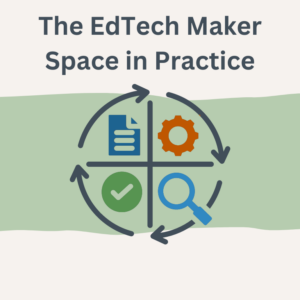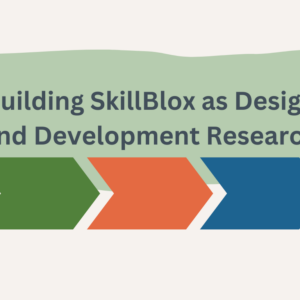What happens when employers start to look at a whole individual—and not just traditional education and work experience on a resume?
A mother finds out that years at home caring for her paraplegic son has prepared her with skills to work in insurance customer service.
Or an unemployed Milwaukee resident who is good with his hands gets the chance (and a bit of additional training) to help build the city’s new arena for the NBA’s Bucks.
That’s exactly what SkillSmart is doing—helping create pathways to employment for skilled workers who would typically receive an outright rejection. The robust skill-matching platform uses skills as a consistent measure of candidate proficiency for specific jobs and provides opportunities for targeted upskilling, leveling the playing field for applicants and improving outcomes for employers.
I’m proud to have partnered with SkillSmart though my work with the Employment Technology Fund (ETF), a social impact fund breaking down barriers to employment for lower-income adults.
ETF invests in early-stage companies that use technology to remove barriers holding these workers back from growing their talent, connecting to meaningful work, and thriving in the economy. SkillSmart’s model does all three—connecting job seekers to opportunities in which they are best fit, identifying clear pathways to upskill, and helping communities better solve their regional skills gaps.
The Challenge: Despite a record number of job openings, millions of adults are struggle to succeed in our nation’s labor market. While people are quick to point to the skills gap as a big part of the problem, the team at SkillSmart believes the traditional hiring process is also to blame.
Job seekers—lacking transparency into the actual skills required for a job—apply for numerous opportunities for which they may or may not be qualified. Employers receive an average of 144 resumes for a single job posting and spend less than
six seconds reviewing each of those resumes. All while workforce development agencies, educators, and trainers are tasked with developing workforce pipelines without a good sense of the actual needs of employers.
And without a clear understanding of the skills required for an open position, employers rely on traditional—and often unnecessary—proxies like degree requirements which arbitrarily reduce the pool of applicants and disproportionately impact underrepresented individuals.
How SkillSmart Works: SkillSmart was built on the knowledge that job seekers have important skill-building experiences that qualify them for work opportunities that don’t often appear on a resume. Using a proprietary skills index, SkillSmart helps employers map, define, and prioritize the skills needed into job descriptions. Through this process, employers start to uncover how certain skills can be earned and validated through previous work, education, or other life experiences.
Job seekers can use the platform to explore job opportunities, understand exactly what skills those jobs require, numerically match to specific jobs based upon their skills qualifications, better understand their own personal skills gap, and learn about regional training opportunities to gain skills to become more competitive for a job opportunity.
The SkillSmart team has proven the model effective for employer, industry, and region-wide use—in markets across the country—demonstrating that the strategy has the capacity and scale to impact unlimited individuals.
Outcomes of the SkillSmart Model in Action:
- Helping a Mother Uncover In-Demand Skills Gained at Home: A Massachusetts mother, who hoped to reenter the paid workforce after staying home to care for her paraplegic son, worried she lacked enough prior work experience to qualify for any good opportunities. By answering questions on her non-work experiences, the SkillSmart platform identified that she had significant experience handling insurance paperwork and a deep understanding of health insurance systems. She was uniquely qualified for a number of medical/insurance customer service opportunities.
- From Ushering on Sunday to a Job with a Top Hospitality Company: A new resort hiring 4000 local workers determined that customer service skills were a top priority for a specific job type. After using SkillSmart’s matching algorithm, the company discovered that many of its top candidates had earned that skill outside of the traditional classroom or workplace – developing the skills instead through volunteerism, such as being ushers in their places of worship.
- Helping the Bucks Hire 40% Jobless or Underemployed Milwaukee Residents to Build New Arena: In Milwaukee, the SkillSmart model helped the NBA’s Bucks meet their objective of connecting local job seekers who were living in poverty to family-sustaining wages supporting the team’s new arena. The Bucks leveraged SkillSmart to hire and train at least 40 percent of their construction team who were previously underemployed, jobless or even unskilled Milwaukee residents.
- Helping Detroit’s Workforce Development Pros Connect Job Seekers to the Pistons: SkillSmart’s team was recently asked to create a pipeline of qualified local workers to support the construction and operations of the Detroit Pistons’ new practice facility—and to help prospective employees gain skills needed for future employment. Chris Purnell, a workforce development specialist with Southwest Solutions, helps Detroit residents re-enter the workforce with training and job placement. “This is exactly what my clients need to connect to great employment and training opportunities in Detroit,” he said, after trying it out himself. “Extremely easy to use, I love how the system asks questions to uncover in-demand skills that people might leave off a traditional resume.”
- Helping Western Massachusetts Upskill Job Seekers with In-Demand Skills: Western Massachusetts is using the SkillSmart model to transform the way the region’s employers, industries, and communities identify, develop, and hire talent. The skills-matching platform connects job seekers with available positions from more than 25 employers in the region. At the same time, the system is gathering real-time insight into where actual skills gaps exist in Western Massachusetts to share with training and education providers.
Field Testing of SkillSmart: The EdTech Center at World Education has been field testing the ETF portfolio of tools to learn the best practices in employment technology and education. In the case of SkillSmart, the field testing is comparing and contrasting both the applicant and employer experience of a traditional hiring process versus SkillSmart’s hiring model.
Look for future postings on the those learnings from field testing can improve technologies’ ability to close the employment opportunity gap for our nation’s millions of lower-skilled, lower income adults.
[author] [author_info] Yigal Kerszenbaum is the Managing Director of the Employment Technology Fund, the first social impact fund to invest in technology solutions that improve employment opportunity for lower-skilled, lower-income adults in the United States. By shaping the future of work, ETF and its portfolio companies will close the employment opportunity gap facing 103 million adults who lack the skills, training and opportunities to access family-sustaining jobs and meaningful employment, including women, minorities, and immigrants. Since launching in August 2017, the Fund has made seven investments including: Cell-Ed, Northstar,Nepris, Signal Vine, CareAcademy, PAIRIN, and SkillSmart. The Fund’s investors include the Walmart Foundation, The Rockefeller Foundation, Joyce Foundation, The W.K. Kellogg Foundation and the ECMC Foundation. Learn more at www.employmenttechnologyfund.com[/author_info] [/author]
[author_info] Yigal Kerszenbaum is the Managing Director of the Employment Technology Fund, the first social impact fund to invest in technology solutions that improve employment opportunity for lower-skilled, lower-income adults in the United States. By shaping the future of work, ETF and its portfolio companies will close the employment opportunity gap facing 103 million adults who lack the skills, training and opportunities to access family-sustaining jobs and meaningful employment, including women, minorities, and immigrants. Since launching in August 2017, the Fund has made seven investments including: Cell-Ed, Northstar,Nepris, Signal Vine, CareAcademy, PAIRIN, and SkillSmart. The Fund’s investors include the Walmart Foundation, The Rockefeller Foundation, Joyce Foundation, The W.K. Kellogg Foundation and the ECMC Foundation. Learn more at www.employmenttechnologyfund.com[/author_info] [/author]





1 Comment. Leave new
This is simply wonderful!! I teach GED at the literacy level and a lot of my students have little or no work experience. I see various skills they have that the students don’t recognize as skills. Various students have had some of the same above challenges. I would be interested in learning more about SkillSmart.
I have also done employment training skills workshops. I believe that there is a job for everyone that wants to work and do what it takes to be employable.